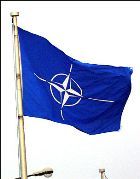NATO ready to help in Darfur, but not with troops
Feb 14, 2006 (BRUSSELS) — NATO allies would look kindly on new appeals for back-up help to African troops in Sudan’s violent Darfur region, but rule out for now a major deployment of their own, NATO diplomats said on Tuesday.
 Fears that Western soldiers would be unwelcome and even counterproductive in Sudan, along with the strain of existing alliance peacekeeping in Afghanistan, mean there is little appetite for rushing into a new NATO ground mission.
Fears that Western soldiers would be unwelcome and even counterproductive in Sudan, along with the strain of existing alliance peacekeeping in Afghanistan, mean there is little appetite for rushing into a new NATO ground mission.
“I don’t think anyone wants that,” said one senior alliance diplomat of calls from aid groups and politicians for NATO to send thousands of its own soldiers to bolster an over-stretched, 7,000-strong African Union (AU) force there.
“The focus is more about extending our support role in the transition from an AU to a blue helmet (United Nations) force,” said the diplomat, who requested anonymity. Last year NATO began help in training and transporting AU troops, insisting back then that it did not seek a major presence on the ground.
The U.N. Security Council assigned Secretary-General Kofi Annan this month to draw up options for a UN force to take over from the AU in a renewed bid to end mass killings and rape in a three-year-old war between the government and rebels.
U.N. officials point to the Western armies of NATO as having the equipment, training and transport to make a real difference in Darfur, echoing aid groups who have long urged a NATO role.
Humanitarian groups Human Rights Watch and the International Crisis Group urged U.S. President George W. Bush in a letter this month to rally NATO allies to offer troops and equipment toward a force numbering as many as 20,000.
Others, including a number of U.S. Democratic senators, have appealed for a NATO contribution of up to a few thousand. But those calls are unlikely to be answered.
AFRICAN SOLUTIONS
While Annan emerged from a meeting with Bush in Washington on Monday confident the United States was committed to helping, he insisted it was too early to discuss any U.S. presence.
One obstacle is that many in the alliance doubt that Sudan would accept Western soldiers on its soil.
U.S. Deputy Secretary of State Robert Zoellick stressed at a conference in Munich this month the need for “African solutions for African problems” and said he hoped many of the AU forces would be retained within a future UN operation.
More fundamentally, some NATO allies such as France have doubted whether the alliance should have any role at all in Africa, insisting it cannot be the “gendarme of the world.”
Despite recent visits to NATO headquarters by Jean-Marie Guehenno, the UN’s top peacekeeping official, and Jan Pronk, Annan’s representative to Sudan, there has been no formal UN or AU request for it even to consider providing more help.
“As a result it is simply too early for any kind of formal discussion,” said one NATO official. Others said Darfur had not come up in meetings of NATO envoys in Brussels nor featured much at talks among alliance defense ministers in Sicily last week.
Those talks, days after NATO troops in north Afghanistan were attacked by protesters angered by European cartoons of Islam’s Prophet Mohammad, highlighted for some a need to bolster existing missions rather than embark on new ones.
“We had great difficulty mobilizing for south Afghanistan,” said one senior diplomat of a plan to extend NATO’s presence with a further 6,000 peacekeepers this year. “Those attacks showed the need to consolidate in the north too,” he added.
Since the AU made a first request for help last April, NATO planes have transported some 4,000 African soldiers into Darfur, trained AU officers and helped with troop rotations.
Diplomats said there was a willingness to extend that help if requested, and possibly help to better arm the AU troops. “There is no serious discussion of anything else,” said one.
(Reuters)
More fundamentally, some NATO allies such as France have doubted whether the alliance should have any role at all in Africa, insisting it cannot be the “gendarme of the world.”
Despite recent visits to NATO headquarters by Jean-Marie Guehenno, the UN?s top peacekeeping official, and Jan Pronk, Annan?s representative to Sudan, there has been no formal UN or AU request for it even to consider providing more help.
“As a result it is simply too early for any kind of formal discussion,” said one NATO official. Others said Darfur had not come up in meetings of NATO envoys in Brussels nor featured much at talks among alliance defense ministers in Sicily last week.
Those talks, days after NATO troops in north Afghanistan were attacked by protesters angered by European cartoons of Islam?s Prophet Mohammad, highlighted for some a need to bolster existing missions rather than embark on new ones.
“We had great difficulty mobilizing for south Afghanistan,” said one senior diplomat of a plan to extend NATO?s presence with a further 6,000 peacekeepers this year. “Those attacks showed the need to consolidate in the north too,” he added.
Since the AU made a first request for help last April, NATO planes have transported some 4,000 African soldiers into Darfur, trained AU officers and helped with troop rotations.
Diplomats said there was a willingness to extend that help if requested, and possibly help to better arm the AU troops. “There is no serious discussion of anything else,” said one.
